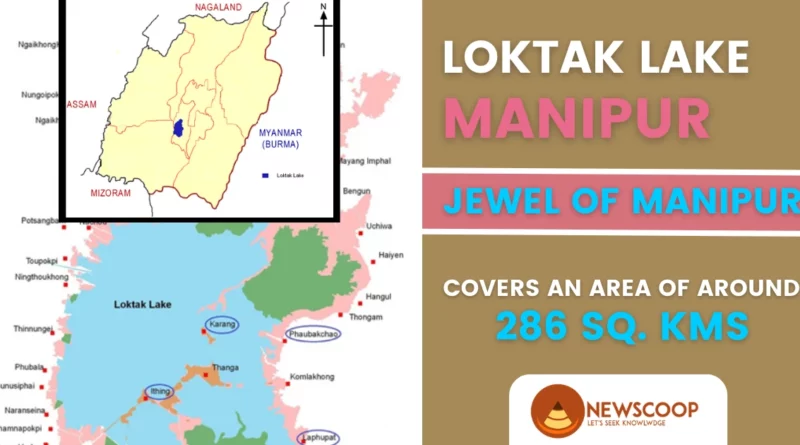Loktak Lake
Loktak Lake is a unique freshwater lake situated in the state of Manipur, in the northeastern region of India. It is the largest freshwater lake in Northeast India and is often referred to as the “Jewel of Manipur“. The lake is surrounded by hills and is known for its floating islands, called Phumdis, which are made up of decomposed organic matter and soil. Loktak Lake is not just a tourist attraction, but also a vital source of livelihood for the people of Manipur.
Location and Physical Characteristics of Loktak Lake
- Loktak Lake is located in the northeastern state of Manipur, India.
- It is situated about 53 km from the state capital, Imphal.
- The lake covers an area of 286 sq km and is at an altitude of 768 meters above sea level.
- Loktak Lake is home to the Keibul Lamjao National Park, the only floating national park in the world.
- It is the largest freshwater lake in Northeast India and is divided into three zones: central zone, core zone, and buffer zone.
- The central zone is the deepest part of the lake and is surrounded by floating islands called Phumdis.
- The Phumdis is made up of decomposed organic matter and soil and is a unique feature of Loktak Lake.
- The core zone is the area where the Phumdis are permanently rooted, while the buffer zone is the area where the Phumdis are floating and drifting.
- The lake is fed by several rivers, including the Manipur River, and has an outlet to the Chindwin River in Myanmar.
- The lake is surrounded by hills and is known for its scenic beauty and unique ecosystem.
- Loktak Lake is an important source of water for irrigation and hydropower generation in the region.
Loktak Lake as a Ramsar Site
Yes, Loktak Lake is a designated Ramsar site. The Ramsar Convention on Wetlands is an international treaty that aims to promote the conservation and wise use of wetlands around the world. Loktak Lake was designated as a Ramsar site in 1990 due to its importance as a unique wetland ecosystem and its significant biodiversity.
As a Ramsar site, Loktak Lake is recognized as a wetland of international importance, and there are several obligations that come with this designation. These include:
- Protection and conservation of the wetland ecosystem: As a Ramsar site, Loktak Lake is protected under international law, and the Indian government is obligated to take measures to ensure its conservation and protection.
- Sustainable use of the wetland: The Ramsar Convention recognizes that wetlands provide many important ecological services, and it is important to use them sustainably. This means that any activities that take place in or around Loktak Lake must be done in a way that does not harm the wetland ecosystem.
- Education and awareness: The Ramsar Convention promotes education and awareness about wetlands and their importance. As part of this, the Indian government is obligated to promote education and awareness about Loktak Lake and the need for its conservation and protection.
In addition to its designation as a Ramsar site, Loktak Lake is also recognized as an Important Bird Area (IBA) and a Key Biodiversity Area (KBA). These designations highlight the lake’s importance for the conservation of birds and other species, as well as its unique ecological value.
Important Species
| Species | Description | Conservation Status |
|---|---|---|
| Sangai | Critically endangered deer species endemic to Manipur, primary habitat is Loktak Lake | Critically Endangered |
| Loktak Lake Carp | Medium-sized wildcats are found in the wetlands and marshes around Loktak Lake | Not Evaluated |
| Indian Python | Large non-venomous snakes are found in the wetlands and forests | Near Threatened |
| Fishing Cat | Large non-venomous snakes are found in wetlands and forests | Vulnerable |
| Spot-Billed Pelican | Large waterbird, important breeding ground in Loktak Lake, considered endangered | Endangered |
| Clouded Leopard | Small deer are found in the grasslands and wetlands around this Lake | Vulnerable |
| Hog Deer | Medium-sized wildcats are found in the wetlands and marshes around Lake | Vulnerable |
Biodiversity of Loktak Lake
Loktak Lake is known for its unique ecosystem and rich biodiversity. The lake is home to several species of flora and fauna, some of which are endemic to the region. Here are some of the key highlights:
- Floating Islands: The Phumdis, floating islands made of decomposed organic matter and soil, are a unique feature of Loktak Lake’s ecosystem. These islands vary in size and thickness, and they support a diverse array of flora and fauna.
- Endangered Species: Loktak Lake is home to several endangered species, including the Manipur brow-antlered deer (locally known as Sangai), which is the state animal of Manipur. The Sangai is only found in the wetlands of Manipur, and Loktak Lake is its primary habitat. The lake is also home to several other endangered species, such as the hog deer, fishing cat, and clouded leopard.
- Bird Sanctuary: The lake is an important breeding ground for several species of birds, including the eastern white pelican, spot-billed pelican, and lesser adjutant stork. The Phumdis provide a unique habitat for these birds, and Loktak Lake has been designated as a bird sanctuary to protect these species.
- Fish Diversity: Loktak Lake is also known for its rich fish diversity, with over 100 species of fish found in the lake. The lake is an important breeding ground for several species of fish, including the famous Loktak Lake Carp, which is a delicacy in Manipur. The fish caught in the lake is an important source of livelihood for the local fishing communities.
- Plant Diversity: The lake is also home to several species of aquatic plants, including the water lily, lotus, and water hyacinth. The Phumdis are covered with a variety of vegetation, including grasses, reeds, and trees.
However, the ecosystem of Loktak Lake is under threat from human intervention and climate change. Conservation efforts are being made to protect the lake’s biodiversity and ecosystem, including the Loktak Lake Conservation Plan and the Loktak Development Authority.
Conservation Efforts and Future Prospects of Loktak Lake
Several conservation efforts have been initiated to protect the lake’s ecosystem and biodiversity. The Loktak Lake (Protection) Act was passed in 2006 to regulate the use of the lake’s resources and protect its ecosystem. The government of Manipur has also launched several initiatives, including the Loktak Development Authority and the Loktak Lake Conservation Plan, to protect the lake’s ecosystem and promote sustainable development in the region.
Conclusion
In conclusion, Loktak Lake is a unique and ecologically important wetland ecosystem in northeastern India. It is home to a wide range of species, including the endangered Sangai deer and many migratory birds. The lake’s importance has been recognized through its designation as a Ramsar site, an Important Bird Area, and a Key Biodiversity Area.
However, the lake is also facing significant threats from pollution, habitat loss, and overfishing, which must be addressed to ensure its long-term survival. Efforts to protect and conserve Loktak Lake are crucial for the preservation of its unique ecosystem and the many species that call it home.
Thank You!
Which deer species is endemic to Manipur and can only be found in Loktak Lake?
The brow-antlered deer, or Sangai, is endemic to Manipur and can only be found in Loktak Lake.
Which international treaty recognized Loktak Lake as a wetland of international importance?
The Ramsar Convention on Wetlands recognized Loktak Lake as a wetland of international importance.

